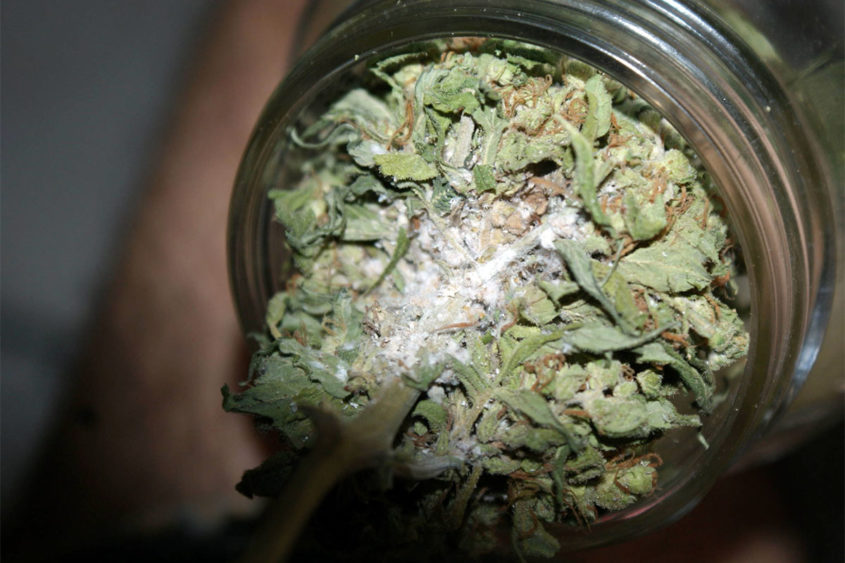Marijuana allergy is real, rare and affects 1 out of every 100 users. Are you one of them?
Look, the chances are slim that you are, but marijuana allergy does exist.
It’s just the truth:
There are people who could smoke 5 grams a day for decades and not even flinch (and they are the majority) and then there are those unlucky few who develop an allergic reaction to cannabis and end up giving up smoking altogether.
I mean, how many Kleenex can you buy before you say it’s enough?
Any contact with the plant can trigger an allergic reaction:
- Smoking dried flowers
- Ingesting CBD oil
- Eating edibles
- Exposure to the plant’s pollen
Every time an allergic person consumes marijuana in any way, shape or form, they are subjected to a different variety of symptoms, which can range from mild to potentially serious if left untreated.
Here’s how marijuana triggers allergic reactions
Marijuana allergy has been investigated in several clinical studies, and two studies have been published recently.
The first one, published in 2013, set about to identify Cannabis Sativa allergens by testing a group of people through skin prick testing. (1)
In their study, researchers found 17 cannabis users who tested positive for an allergic reaction to cannabis. All patients showed similar symptoms (which you can find below) but, most importantly, this study identified what exactly causes people to be allergic to weed.
The big answer:
Peptides from enzymes connected to the plant’s primary metabolism.
For all of you chemistry geeks out there, these are RuBisCO, oxygen evolving-enhancer protein, ATP synthase, phosphoglycerate kinase, and glyceraldehyde-3-phosphate dehydrogenase.
The second study was published in 2015 — this one categorized cannabis allergy as something like fruit and vegetable allergy, therefore placing it in the “cannabis-fruit/vegetable syndrome”. (2)
Some would say that this is minor, and that pineapple has never killed anyone. But there’s a twist…
This 2015 study explored various possibilities of cross-allergic reactions with tobacco, natural latex and plant-derived alcoholic beverages. Which is pretty good to know, having in mind that weed is often smoked with tobacco, in blunts for example.
If we get rid of the scientific jargon, we can see that these two studies helped us understand something very important:
Marijuana allergy is very rare but when it does occur it has similar symptoms as some common food and plant allergies.
We got the plant’s role down, now we need to address another allergen that can be found in low-quality buds:
Mold.
Mold can be commonly seen on weed that hasn’t been stored and cured properly.

If you remember our weed expiration date article, moldy weed can be toxic and unsmokable, and can even cause respiratory issues in some cases.
Besides being weed’s number one enemy, the mold is also an enemy of the humans (it’s basically Batman vs Joker at this point).
When you smoke moldy weed you also inhale mold spores, which can cause symptoms such as itching, runny nose, nasal congestion.
Long-term smokers can develop an intolerance also
Marijuana allergy is not limited to first time users. It can happen with long-term users as well.
Just so you know.
There is a condition called Cannabinoid Hyperemesis Syndrome (CHS) — if you’ve been smoking marijuana for a long time you’ve probably heard about it.
According to this 2011 publication by the Temple University Hospital, CHS is characterized by chronic cannabis use, cyclic episodes of nausea, vomiting and bathing with hot water (which is a learned reaction apparently). (3)
It develops all of a sudden and ONLY in long-term regular smokers. And it sucks.
I came across an NY Mag interview of a woman that found out she has CHS. She had terrible nausea and vomiting sessions and finally, after a dozen tests, her doctor told her that she developed an intolerance to cannabis.
In the end, she had to quit smoking. Yikes.
The most common marijuana allergy symptoms
All cannabis allergy symptoms usually occur 20-30 minutes after exposure to the plant.
And by that, I mean any kind of contact — it doesn’t matter if you smoke it, eat it, inhale pollen or even touch the plant.
But how do you know if you’re having an allergic reaction to weed?
Pretty simple, if you experience one of the following the next time you use weed, then you’re probably allergic.
Here are the most common marijuana allergy symptoms:
● Sore throat
● Nasal congestion
● Rhinitis
● Watery eyes
● Post-nasal drip
● Inflammation of the throat
● Difficulty breathing
● Swelling below the surface of the skin
● Vomiting
● Gastric cramping
● Itching
● Rashes
Take note that that the intensity of these symptoms can vary, depending on the amount of cannabis you consumed.
For example:
An allergic person who smoked 4 joints can experience more itching than a person who smoked 1 joint.
Even though marijuana allergy usually presents itself with mild symptoms, such as a runny nose and watery eyes, there are some unlucky people who get the short end of the stick and get a potentially deadly reaction called anaphylaxis.
Anaphylaxis from smoking weed does happen:
A couple of minutes after ingesting marijuana, an allergic person experiences reaction not just in one spot, but throughout their entire body, setting off a chain of physiological processes that send him into a state of shock.
Anaphylactic shock is life threatening and should be treated ASAP with a shot of adrenaline (Epinephrine).
Learn the signs of anaphylactic shock
Every person should learn to recognize the symptoms of anaphylaxis, smoker or not.
It can happen with just about any allergen and it is an extremely dangerous reaction that
requires immediate medical attention. If you know to recognize it, you can get help much quicker and that can save your life.
According to EpiPen, these are signs and symptoms of anaphylaxis:
- Skin reactions (generalized hives, itching, swelling, reddening)
- Respiratory problems, swollen throat and tongue
- Reduced blood pressure, dizziness and fainting
- Vomiting, abdominal & GI cramping
If someone has these symptoms, call an ambulance right away, because that person needs urgent help.
Thankfully, anaphylaxis can be resolved in a couple of minutes with a shot of adrenaline — it complements your body’s own adrenaline to reduce throat swelling, open up breathing pathways and regulate blood pressure.
How to treat marijuana allergy
So, after all of this, you’re pretty sure that you are allergic to weed?
OK, first, book an appointment with your doctor. An allergist would be the best bet.
They’ll do a skin test and prescribe a therapy, tailored to your symptoms. The therapy can involve either medication or completely avoiding any contact with marijuana.
If your allergic reaction to weed is severe, then you need to quit smoking altogether.
However, since I know that most of us like to delay a trip to the doctors as much as possible, you can always use a nasal spray and some antihistamines for treating the acute onset of mild marijuana allergy symptoms.
As things are currently, there is only a small number of reported cases of marijuana induced allergies.
But as weed becomes more and more accepted, you can bet that we’ll start seeing more people complaining about allergic reactions to the plant.
Those people will be growers, people who live next to cannabis fields or regular users. The good news is:
Marijuana is, in the end, a very mild allergen and can be safely consumed by 99% of users.
Unfortunately, there will always be an unlucky few.
References:
- Nayak AP, Green BJ, Sussman G, Berlin N, Lata H, Chandra S, ElSohly MA, Hettick JM, Beezhold DH; Characterization of Cannabis sativa allergens; Annals of Allergy, Asthma and Immunology; July 2013; 111(1):32-37
- Decuyper I, Ryckebosch H, Van Gasse AL, Sabato V, Faber M, Bridts CH, Ebo DG; Cannabis Allergy: What do We Know Anno 2015; Archivum Immunologiae et Therapia Experimentalis; October 2015; 63(5):327-332
- Galli JA, Sawaya RA, Friedenberg FK; Cannabinoid hyperemesis syndrome; Curren Drug Abuse Reviews; December 2011; 4(4):241-9





Jane August 24, 2018 at 8:08 pm
I am not a heavy weed user and really just started using it about a year and a half ago. I usually have 4 or 5 puffs at night as it helps me to sleep. In the past few months I am starting to wonder if I have an allergy to weed. What I don't get is, after I've smoked and am moderately high, I have no symptoms and feel great. However, when the high wears off in a couple of hours, I am back to being itchy in spots usually with a rash or hives. I get itchy scalp a lot too. Does this sound like an allergy to weed?
Matt September 12, 2018 at 10:21 pm
Yeah, sounds exactly like what I get. It takes awhile to work it's way through your body. When I smoke it regularly anyways my scalp will itch and eventually kind of weep fluid like it's trying to excrete the allergen and I can get hives and excema. If I keep smoking say everyday for a month or so it starts to irritate my blood vessels, giving me headaches, heart palpitations and making my temples sore. It's apparently called temporal arteritis and basically is the arteries spasming and constricting, because they are irritated from the allergen. I love marijuana, but over the years have discovered that unfortunately I seem to have developed an allergy to it, so I need to indulge much less frequently. It took me years to figure this out as I previously used to smoke everyday for years without issue. Also, if I smoke too much I can get a more acute reaction where my head feels like it's in a vice, my hands and legs get cold, I feel woozy, my heart palpitates and I get really sensitive to stimuli. Thing is I'm young healthy and athletic, it's just an allergic response. I'm only telling you this, because it seems you have an allergic response as well, so be aware that if you use it too much or too often you can start to irritate your circulatory system. It took me years of denial and research to realize what was going on,so hopefully I can save you some trouble.
Teresa September 29, 2018 at 4:38 pm
I too have been a daily smoker for about 10 years. I have recently developed eczema type rashes along with sebhoroheic dandruff where the scalp overproduces sebum (then dries, flakes & itches like crazy). I have wondered if my marijuana use is the cause but of course hate to give it up. I have also experienced terrible headaches but switching to a different strain took care of that. After reading your comment, I think I must give quitting a try as this is becoming unbearable. Luckily, I am traveling overseas for a week soon so it will be a good time to see if quitting provides any improvement.
Amanda November 23, 2018 at 4:24 am
I am a 41 year old woman. I have smoked for probably over half my life. The last few months I have had terrible rashes, itchy scalp, hives, lip swelling , and even my mouth and inside my ears itch. I’m going to book a doctors appointment. I’m going to be so sad if I’m allergic. What do you think?
R May 5, 2019 at 5:32 pm
Chances are if you are having an allergic reaction (and it's way more common than stated here) it's because you have a terpene allergy. I sadly am allergic to Linalool, Limonene and Pinenen. Want to know, get patch tested with a dermatologist who specializes in patch testing (if you are allergic to Linalool and Limonene you most likely are allergic to fragrance as well and many essential oil) It's a bummer!
E December 4, 2020 at 2:02 am
Yes!! This is what I was thinking! Only certain strains make my upper lip swell.
Michelle Covais August 8, 2019 at 12:18 pm
My God.....I've been covered in contact dermatitis and was blaming everything testing everything to no avail.....I got new rashes today and my gf had told me last week that she has a Mari allergy.......I can't believe THIS IS WHATS HAPPENING.....BYE WEED....😳😖😖😖😖😖😖😖😖😖😖👎
bds May 16, 2020 at 4:23 am
could be grow chemicals not being flushed .more likely you are allergic to the chemicals than the cannabis
Devorn A Mcdonald August 28, 2020 at 12:41 pm
When i smoke outdoor weed i get he and I sneeze a lot but when I smoke indoor weed Hydroponics I don't feel good and I don't have it why is that?
Michelie February 29, 2020 at 6:55 pm
Well, this article has opened my eyes and hopefully answers a lot of my issues. I am allergic to Fragrance Mix, Balsam of Peru and Colophony. My mouth burns on contact when I am around any of this and the burn ramps up during the day. At night I have vaped which makes me happily un-annoyed by the burning sensations. Just over the last three days, directly following vaping, my scalp feels super sensitive, burning-like and painful to the touch. It is 90% gone in the morning. I'm taking the vape back to the dispensary. I am so sad - I believe I am too, allergic to cannabis. ugh.
bds May 16, 2020 at 4:25 am
sounds like you are allergic to the gc or other solvent in the cartridge, possibly butane.
ichy March 19, 2020 at 6:19 pm
well im one of the unlucky ones I guess.. im a long time weed smoker, prob over 25 years consonantly. Every other time I smoke now I get a major head cold, with sneezing, watering eyes, ichy nose, im all clogged up etc.. its so annoying that Im considering the worst and thats quitting. I wonder if what Im smoking is outdoor weed, vs. the hydroponic weed which does not bother me at all -but I find is too weak sometimes..
George May 4, 2021 at 1:40 am
I’m 44 years old been smoking on and off 20 years , Iv started feeling allergic reactions lately.Does anyone know how long symptoms last? I think I’m allergic to weed now and the reaction vs the high is not worth the trouble. I think I have to stop. Kinda pissed off about this as this was my chill, relax thing I would do.